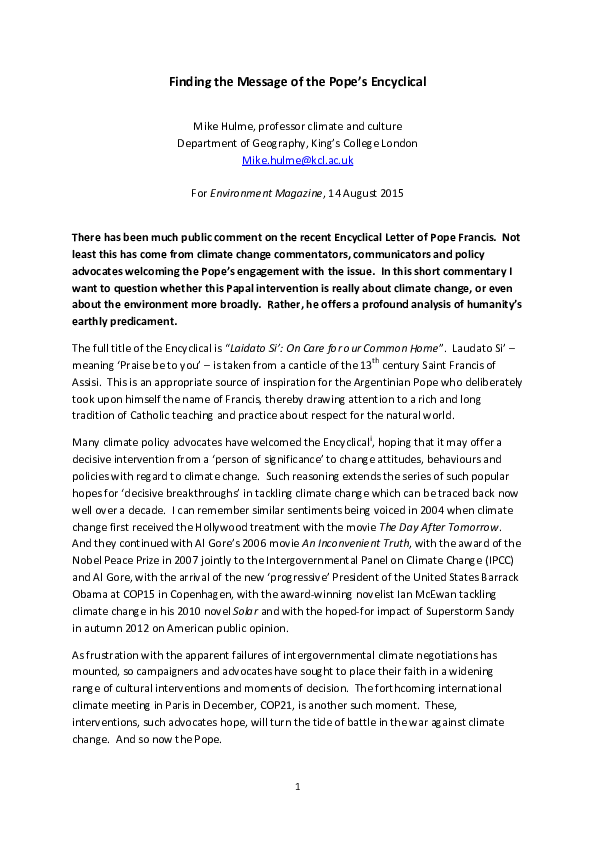Academia.edu no longer supports Internet Explorer.
To browse Academia.edu and the wider internet faster and more securely, please take a few seconds to upgrade your browser.
Finding the Message of the Pope's Encyclical
Finding the Message of the Pope's Encyclical
Environment Magazine
There has been much public comment on the recent Encyclical Letter of Pope Francis. Not least this has come from climate change commentators, communicators and policy advocates welcoming the Pope’s engagement with the issue. In this short commentary I want to question whether this Papal intervention is really about climate change, or even about the environment more broadly. Rather, he offers a profound analysis of humanity’s earthly predicament.
Related Papers
The Quarterly Review of Biology
IV. Pope Francis’ Encyclical Letter Laudato Si’, Global Environmental Risks, and the Future of Humanity2016 •
Harvard Kennedy School Review
The Cry of the Climate and the Cry of the Poor: Pope Francis’s Urgent Appeal for Climate Justice2017 •
Pope Francis transformed the climate change debate in 2015 by publishing his groundbreaking encyclical Laudato Si’, being widely credited by analysts and heads of state for raising the level of ambition of the Paris Climate Agreement by framing the ecological crisis in moral terms. This paper analyzes Pope Francis's contribution to highlight both the urgency and the injustice of the climate crisis. In doing so, the essay highlights the unique opportunity of world religions to enhance climate policy by stressing the moral imperative to take action.
2011 •
“At the very outset of the encyclical, before any mention of climate change or global warming, Pope Francis issues a challenge to the Baconian and Cartesian view, which sees the world as so much raw material to be used as we please. Neither Descartes nor Bacon is mentioned by name, but the reference is unmistakable”. Stephen P. White.
Text of talk delivered at Loyola College, Chennai, on July 17, 2015 at a Panel Discussion on Laudato Si
Journal of Social Encounters
The Fierce Urgency of the Slow: How Pope Francis is Calling Us to Save the Planet2022 •
Addressing the urgent issues facing humanity today, in his recent encyclical on social friendship, Fratelli Tutti, Pope Francis reminds us that it is "all the more urgent that we rethink our styles of life, our relationships, the organization of our societies and, above all, the meaning of our existence" (no. 33). In this and in his previous encyclical on care for creation, Laudato Si', Francis makes clear that we do not have a moment to waste. None of his diagnosis should "be read as a cool and detached description of today's problems" (no. 56). Before an onslaught of urgency backfires in paralysis, however, we might notice a heartening paradox: Read carefully, Francis's message to us is that we move quickly to slow down! Yes, "rethink" immediately. Yes, act now, and "boldly." But then, once we have promptly changed direction, Francis insists that we take all the time we need. After all, what we most urgently need is to do the hard work of truly human encounter on the way to authentically human solutions. We might call this "the fierce urgency of the slow.
Human Ecology Review
Reflections, Analysis, and Significance for Human Ecology of Pope Francis’s Encyclical Letter Laudato Si’: On Care for Our Common Home2017 •
William and Mary Environmental Law and Policy Review
Pope Francis, Laudato Si', and U.S. Environmentalism2017 •
2015 •
Laudato si’ has been billed by many as Pope Francis’ intervention in the climate change debate, but it is so much more than that. In this detailed analysis of the Pope’s first encyclical, Damian Howard sets the text in its cultural and political context, and asks how it fits into the tradition of Catholic Social Teaching. How does this ‘exciting new synthesis’ of Catholic theology and the ecological movement have the potential to change our civilisation?
RELATED PAPERS
International Journal of Language & Communication Disorders
Long‐term effects of PECS on social–communicative skills of children with autism spectrum disorders: a follow‐up study2014 •
Journal of Cleaner Production
Biochar: Production, properties and emerging role as a support for enzyme immobilization2020 •
Surface & Coatings Technology
Development of (Cr,Al)ON coatings using middle frequency magnetron sputtering and investigations on tribological behavior against polymers2014 •
Journal of Agricultural Informatics
Preparation of a dynamic simulation model to support decision making in a sensitive rural area2015 •
2021 •
2000 •

 Mike Hulme
Mike Hulme